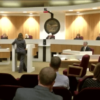Senate President Pushes Back On Chief Justice

Senate President Jason Ellsworth, R-Hamilton, has taken a stand against what he describes as an unconstitutional directive from Montana Supreme Court Chief Justice Mike McGrath. On Tuesday, Ellsworth sent formal letters to both McGrath and Judicial Standards Commission (JSC) Chair Judge Mike Menahan, contesting the Chief Justice’s recent edict.
Both McGrath and Menahan previously served as a elected Democrats prior to taking the bench.
Ellsworth’s move includes issuing subpoenas to eight key government officials involved in the JSC’s rulemaking process, requiring their attendance at a meeting of the Senate Select Committee on Judicial Oversight and Reform (SJOR) scheduled for tomorrow. The officials subpoenaed are JSC members Judge Mike Menahan, Judge Randal Spaulding, Jill Gerdrum, Roger Webb, and Seth Berglee; JSC Secretary Shelly Smith; Supreme Court Administrator Beth McLaughlin; and Montana Supreme Court staff attorney Jeanine Blaner.
The subpoenas, copies of which are attached to the release, demand that these individuals provide insight into proposed changes to JSC rules. The language of the subpoenas issued to other individuals is similar to the one attached.
In a letter dated August 6, Chief Justice McGrath had directed other members of the judicial branch and the JSC to refrain from participating in SJOR meetings. He also asserted that SJOR lacked the authority to scrutinize the JSC and incorrectly claimed that the Constitution mandates confidentiality for JSC complaints unless released by the complainant after the process concludes.
Ellsworth refutes these claims, arguing that McGrath’s directives exceed his constitutional authority. According to Ellsworth, the Chief Justice does not have the power to dictate how elected justices and judges interact with the Legislature. The JSC operates as a separate constitutional entity, established by the Legislature and not under Supreme Court control. Additionally, the Constitution and state law do not limit SJOR’s authority compared to other legislative committees, and recent legislation has even called for increased transparency from the JSC.
In his response to McGrath, Ellsworth criticized the Chief Justice for issuing what he views as an overreach of authority. “Outside any existing cause of action before the Court and well beyond any administrative authority you may have over Montana courts, you mail me an edict…To have any integrity at all the JSC must have independence from the Chief Justice and Supreme Court intermeddling prematurely…you and the judges you lead may only instill public trust and confidence in the judiciary by opening the doors and letting the sunshine in,” Ellsworth wrote.
Addressing JSC Chair Menahan, Ellsworth underscored that McGrath’s directive was non-binding and outside constitutional parameters. He emphasized that neither the JSC nor the Legislature is obliged to follow the Chief Justice’s administrative edicts.
“JSC and the Legislature do not take direction from Chief Justice McGrath. Neither Justice McGrath nor the Supreme Court may direct anyone, including JSC, to not cooperate with the Legislature via administrative edict…Given the uncertainty the Chief has caused, subpoenas were personally served and should make clear you are on formal notice of your obligations…Given the role of the Supreme Court in inviting the contempt, it would not have the requisite impartiality to hear the contempt case and would need to recuse,” Ellsworth stated.
Tomorrow’s SJOR meeting will delve into proposed substantial changes to the JSC’s operational rules. The eight officials subpoenaed are anticipated to provide crucial perspectives on the rulemaking process and the nature of the proposed changes.
By: Politics406 staff











